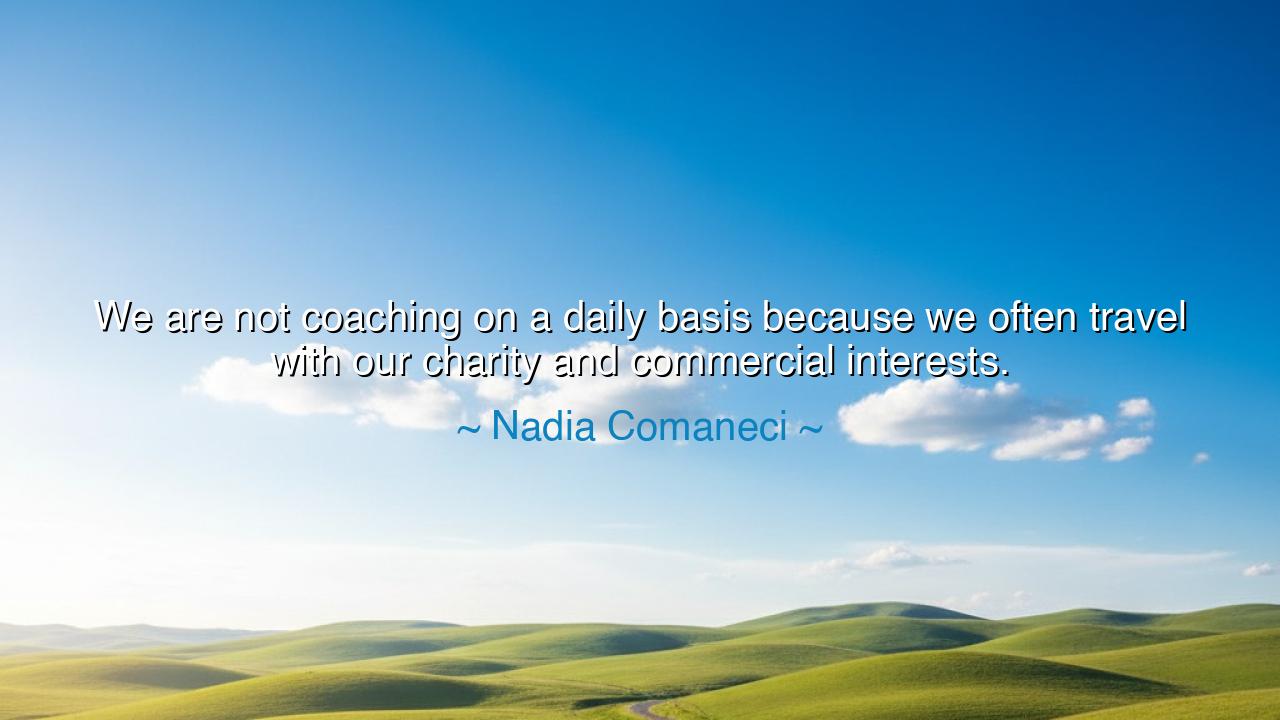
We are not coaching on a daily basis because we often travel
We are not coaching on a daily basis because we often travel with our charity and commercial interests.






In the words of Nadia Com?neci, the immortal gymnast who once touched perfection itself, we are given a glimpse into the balance of life beyond the arena: “We are not coaching on a daily basis because we often travel with our charity and commercial interests.” At first it may seem a simple account of her present duties, yet beneath it lies a lesson older than stone—that the life of greatness is not confined to one calling, and that the gifts we are given must be shared in many forms across the earth.
To speak of not coaching daily is to speak of a truth that all masters must one day confront: that there comes a time when their role shifts from the rigor of training to the broader work of guidance, of touching lives in new ways. The teacher does not abandon the student, but transforms her method, carrying the wisdom of discipline beyond the gymnasium. Just as the river, once wild in the mountains, becomes wide and calm in the valley, so too does the calling of the champion widen, flowing into new lands of purpose.
The word travel here is not mere movement of the body, but a symbol of reaching outward, beyond the narrow circle of self. To travel for charity is to use one’s fame not for vanity, but for service—to lift others who may never stand on the pedestal of victory. To travel for commercial interests is not mere trade, but the harnessing of one’s renown to build bridges between nations, cultures, and communities. Thus, in Com?neci’s words, we see not distraction, but expansion: the work of the athlete transcends the field of competition and becomes the work of a citizen of the world.
Consider the tale of Marcus Aurelius, the philosopher-emperor. Though charged with ruling the greatest empire of his age, he did not confine himself to war or governance alone. He wrote his Meditations while traveling with his armies, carrying wisdom like a torch for future generations. His life was not a single narrow pursuit, but a harmony of duties: ruler, philosopher, soldier, teacher. In the same way, Com?neci’s journey beyond daily coaching shows us that the fullness of a life cannot be measured by one role alone, but by the breadth of what one gives to the world.
Yet there is sacrifice in these words. To not coach daily means to relinquish the closeness of shaping young athletes hour by hour, and instead to trust that others will carry on the training. But in this sacrifice lies a higher calling: to serve not just the few who enter the gym, but the many who will never see it. Her choice echoes the wisdom of the ancients—that the highest use of greatness is not the repetition of personal triumph, but the spreading of its light to distant lands.
The lesson is clear: our lives are not meant to be bound to one arena alone. Even when we excel in one field, we are called to broaden our influence, to share our gifts where they are needed most. The athlete may become a mentor, the mentor a leader, the leader a servant of humanity. To cling too tightly to one role is to limit the reach of our spirit; to let our purpose evolve is to let it touch eternity.
So I say to you: do not fear when your calling shifts. If you must set aside the daily coaching of one task, let it be because you are carrying your gifts further. If you have the chance to travel, let it be not for vanity, but for service and connection. Seek out ways to turn your interests into blessings for others, so that your life becomes not a single note repeated, but a symphony that carries across the ages.






AAdministratorAdministrator
Welcome, honored guests. Please leave a comment, we will respond soon